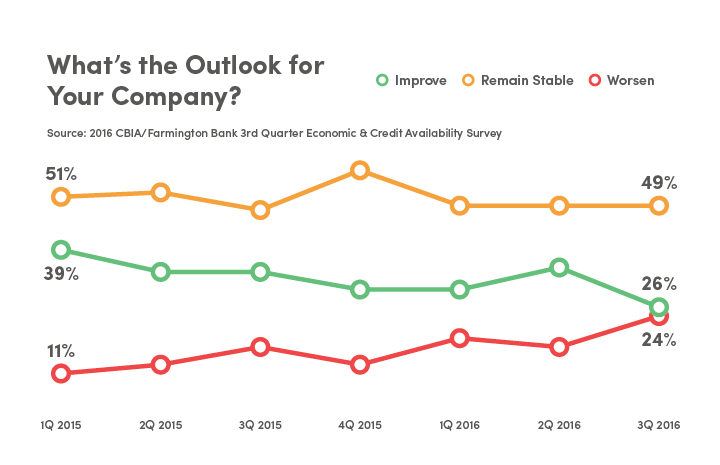Big Challenges, Yet Hopeful 2017 Outlook

Connecticut has great economic potential.
Our base of industry in manufacturing, financial services and bioscience is one any state wishes it had.

A recent survey revealed ongoing concerns from business leaders about the state economy’s modest growth.
We should remain hopeful, however, as there are signs that we can fix this:
• The risk of recession, according to Moody’s, is at 10%, a historically low number for the state.
• Consumers have more money to spend because of cheap gas at below $50 a barrel and moderate income hikes.
• Housing starts and sales are increasing while prices remain moderate, and interest rates will remain low, despite two three-quarter point Fed rate hikes.
• In addition, credit availability remains strong, and strong efforts are being made to create and fill jobs, especially in manufacturing.
Locally, the three powerhouses of Pratt & Whitney, Electric Boat, and Sikorsky will stimulate activity, not only in their firms, but with their massive supply chain of 1,000-plus Connecticut subcontractors that benefit from their success.
Other good news? Although slow, financial-services jobs are coming back and the impact of firms ramping up operations in New York due to Brexit may benefit Connecticut.
All of this bodes well for us.
Jobs, Economic Growth
Looking into the new year, we should be mindful of challenges that are clouding what would otherwise be a more positive outlook on Connecticut’s economy in the medium- and long-term future.
First, the state’s November labor report recorded a small increase of 2,100 jobs, but big losses in October (-5,800) and September (-6,600) are more troubling.
Connecticut has only recovered 72% of jobs lost during the recession. Connecticut and Maine are the only New England states with less jobs than when the recession began in February 2008.
The state’s unemployment rate is 4.7%. Among the New England states, only Rhode Island has a higher unemployment rate.
Year over year, Connecticut has created only 1,400 net new jobs.
Secondly, a recent quarterly credit and economic survey of state businesses revealed ongoing concerns from business leaders about the state economy’s modest growth, which is at its weakest since the Great Recession.
Third, only 26% of those surveyed expect conditions to improve for their company; more troubling is the additional 24% that expect conditions to worsen.
When asked if they plan to hire, only 19% expect to add workers and 23% expect to cut jobs. Credit conditions have marginally weakened as well.
Legislature’s To-Do List
These challenges can be addressed, and now that the election is over, the incoming legislature’s “to-do” list is becoming clearer.
Given that thousands of jobs are going unfilled, as Baby Boomers retire, we need to spur the growth of our homegrown talent pool from state high schools and universities.
Even non-defense, non-aerospace manufacturers are clamoring for hundreds of workers. This legislative session, lawmakers must drive policies that encourage firms to train employees and students alike in the newest skills.
The state's real issue is to get its own fiscal house in order and avoid more anti-business mandates.
Gov. Dannel Malloy has promised to address this without adding new taxes. It will be a daunting challenge, but Connecticut cannot afford more tax increases.
Given the even split between Republicans and Democrats in the state Senate, and the narrow Democratic majority in the House, it is imperative that the incoming legislature put partisanship aside to work with Malloy on a solution.
National Impact
Nationally, the Trump administration will be a mix for business but on balance, I expect it to be somewhat positive.
His position on trade, immigration, and overseas corporate profits may hurt, but any rollback of anti-business regulation and renewed focus on jobs, as well as transportation and manufacturing, will help the economy.
Overall, I expect Connecticut will finish 2017 in more positive economic territory than today.
The economy will see a slow start in the first two quarters and likely gain steam in the latter half, given federal impacts that will accelerate jobs and confidence.
What happens with Connecticut's state budget remains to be seen, but resolving forecasted deficits without raising taxes will be a very positive achievement for the state and its residents.
Ultimately, Connecticut will marginally benefit from stronger U.S. growth and should be slightly impacted by slow global growth.
The real issue for the state is to get its own fiscal house in order and avoid more anti-business mandates.
If we can do that much, the state will substantially improve business confidence here, leading to more investment and job growth.
There's a lot to watch.
Pete Gioia is an economist with CBIA. Follow him on Twitter @CTEconomist.
RELATED
EXPLORE BY CATEGORY
Stay Connected with CBIA News Digests
The latest news and information delivered directly to your inbox.


